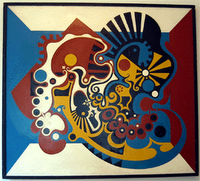Stephen and John
 My father, Stephen, was a painter. He died when I was three years old. By all accounts he was handsome and charming in the way young men were in the 1960’s. He had just finished grad school where he obtained a master’s degree as a landscape architect and was an up-and-coming artist, beginning to gain recognition on a large scale. He was twenty-eight and even though he had a wife and two young daughters, he was what most 60s artists were: adventurous and walking that fine line between forcing and coaxing his inspiration.
My father, Stephen, was a painter. He died when I was three years old. By all accounts he was handsome and charming in the way young men were in the 1960’s. He had just finished grad school where he obtained a master’s degree as a landscape architect and was an up-and-coming artist, beginning to gain recognition on a large scale. He was twenty-eight and even though he had a wife and two young daughters, he was what most 60s artists were: adventurous and walking that fine line between forcing and coaxing his inspiration.My mother speculated that my father was driven by a sense of competition with his own father, John. John wasn’t the type of father to encourage with praise. John was moody and somehow managed to be both self-loathing and an egomaniac. One of my early memories of John is of him sitting in the living room at the large round coffee table. On the table was a small black-and-white TV, a pitcher of gin martinis, a jar of pickled onions, a box of Saltine crackers, and a small jar of caviar, with all the appropriate accoutrements. Later, I realized he also had a small brown bottle of Valium in his shirt pocket. He left no nerve untouched. John stayed in front of the TV all afternoon, only moving to change stations to the next sporting event when an ad would come on.

Even though Stephen’s paintings were garnering critical praise in the national modern art community, John had never acknowledged to him that his work was good. My mother later said my father was put in the position of having to prove to John that he was good at things. They had become competitive, and Stephen would eventually win. Stephen painted as well as his father, he earned a similar academic standing, and he abused as harsh substances as his father. It was almost ironic that Stephen died when he did and silenced the competition once and for all – proving himself as a more effective substance abuser than his father ever was. John spent his entire 75 years trying to kill himself, but never actually succeeded on his own. Stephen never consciously tried to kill himself, but succeeded nonetheless while chasing a 60s pop culture muse of hepatitis-infused heroin. He died in July 1968.
Many years later, I suspect my mother had no qualms about phoning the Hemlock Society on John’s behalf. It did occur to me that she might not have had completely altruistic intentions where John’s life was concerned, but in the years since then I have come to think of her phone call as the ultimate act of mercy. She provided John with the information he needed to end the chronic pain of the cancers that were slowly destroying his body. And maybe more importantly, she finally gave him his answer. He would finally understand which steps he had overlooked all those other times when he had tried and failed at what Stephen so effectively accidentally accomplished nearly 20 years previously.
top: "Lightning Express" (1968)
bottom: "Chocolate Landscape and Boxwork's Dream" (1968).
footnote: check out Grandpa John in "U.S.A. vs. Tokyo Rose" now showing on the Documentary Channel. There he is: disgruntled grand juror and one of two hold-outs against the prosecution. Although he has less than a minute of airtime, it is classic John. No one says "God-damned" quite the way he did.


2 Comments:
I loved the story about your father Stephen - and totally dig the art work.
I also think the family portrait is really neat!
Sounds like you've had an interesting life.
Continue blogging - I'd like to hear more.
Wager Witch
http://wagerwitch.blogspot.com
Free No deposit casino bonuses, repeat deposit deals, Casino Promotions, Savvy Gambling advice and More!
The pieces are coming together Davis..DavisJones...Cyrus...Cyrus Jones - Very clever C. The Mind of Lee is quite interesting also. I suspect coffee someday would be very nice - next time i'm in KC i'll be looking you up. and I've taken your advice...
peace,
ElanoRigby
Post a Comment
<< Home